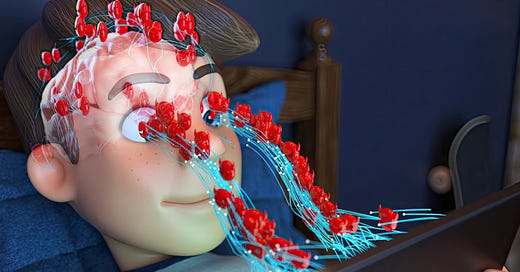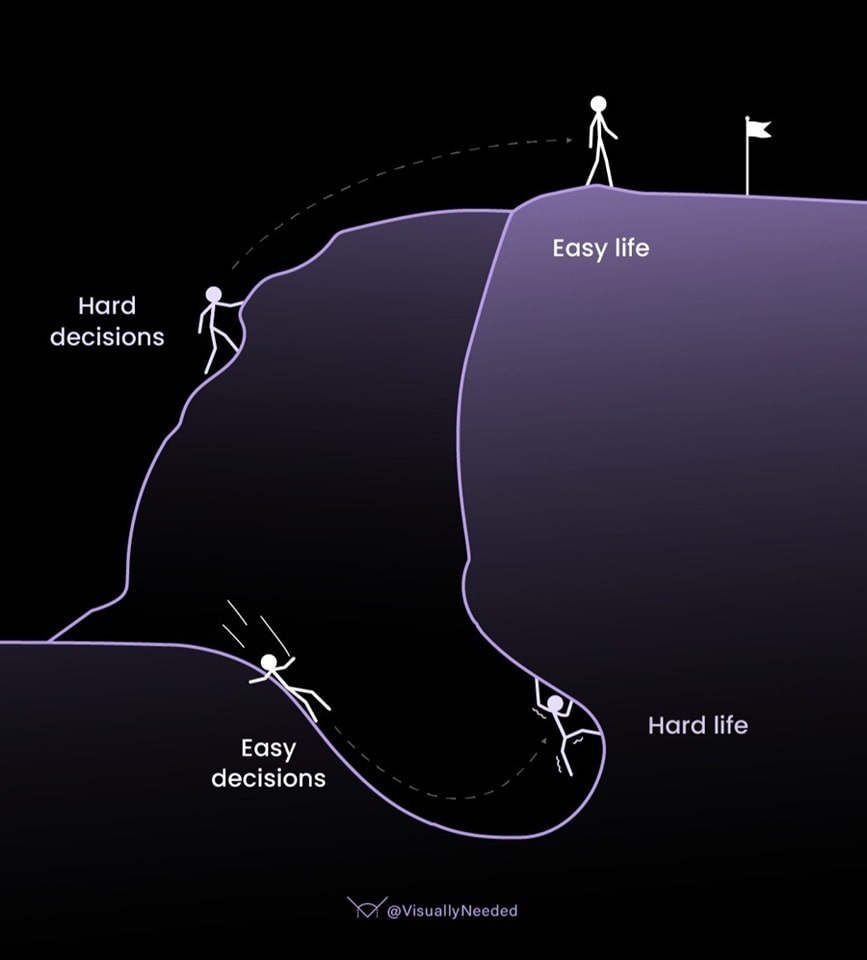Why I'm Skeptical About Warning Labels on Social Media
We have a parenting problem, not an awareness problem.
Last spring, I wrote a post about the U.S. Surgeon General issuing an official advisory against social media. Now, Dr. Vivek Murthy is back with another, more vehement message. This week, in a New York Times op-ed, he calls for warning labels to be added to social media platforms:
“A surgeon general’s warning label, which requires congressional action, would regularly remind parents and adolescents that social media has not been proved safe.”
The presence of a label “can increase awareness and change behavior,” Murthy writes. Labels helped to deter people from tobacco products in the 1960s, and he believes they could do the same with social media. He cites a recent survey of Latino parents, where 76% agreed that a surgeon general’s warning would “prompt them to limit or monitor their children’s social media use.”
I appreciate Murthy’s stance. This is indeed “big news,” as Jonathan Haidt and Zach Rausch describe in their Substack newsletter. It is a welcome indicator of a critical shift that needs to occur in our societal attitude toward social media and its role in children’s lives. Five years ago, it would have been unimaginable to read such a statement. Progress is happening. I am happy for that.
And yet…
I don’t feel the kind of joyous enthusiasm that so many others are displaying today in response to Murthy’s column. Why? Because slapping a warning label onto social media seems an awful lot like slapping a Band-Aid onto a serious wound. It feels insufficient.
Yes, yes, I know. I can already hear the cries of “Baby steps! First steps! A move in the right direction!”—none of which I dispute. But as the saying goes, “Extraordinary times call for extraordinary measures,” and if the problems caused by social media are as serious as the research shows them to be, a warning label seems woefully inadequate.
Serious question: Do we truly think that many parents are unaware of the fact that social media is harmful to their kids?
I don’t know the answer to this, but I don’t think so. You’d have to be living under a rock at this point to think it’s a positive social force for children and adolescents. I have never met a single parent who is happy their kid uses social media and would be OK with them spending more time on it.
Indeed, most parents, educators, and Gen Z members themselves are the first to point their fingers at social media as a root cause of young people’s mental distress. From After Babel: “We have looked for young people who think the phone-based childhood has been good for their generation and have found hardly any.”
Another serious question: Do we really think that putting a warning label on social media platforms is suddenly going to transform kids’ screen time habits?
Do we honestly believe that the average of 4.8 hours per day that teens spend on social media alone (not counting other online activities) is suddenly going to plummet because there’s a little warning box that pops up whenever they log in? And do we expect busy, exhausted parents to suddenly find the time and energy to crack down on kids’ social media usage from now on? Of course not! We’d be delusional to think so. It might happen temporarily, but it’ll fizzle out.
We do not have an awareness problem. We have a parenting problem.
And this is where it gets a bit uncomfortable.
Too many parents are passing off the responsibility of making tough choices about raising their kids in a digital era to politicians, doctors, school administrators, and even the tech companies themselves. They don’t want to do the dirty work of saying no to their children who ask for smartphones and social media because “everyone else is doing it.”
To be clear, everyone needs to be part of this solution. We absolutely need tighter regulations and laws to protect children, just as we have them for seatbelts and alcohol and X-rated movies. I don’t deny that. Parents can’t do it alone. They need to be supported in their efforts on all sides.
But when timing is so critical, and kids are being exposed to a harmful substance for multiple hours a day right now, we can’t afford to wait around for legislation to change, for official advisories to be issued, for lawsuits to trickle through the glacial justice system, for warning labels to appear. We need to step in as authoritative parents and trust our instincts that something is off, without waiting for the experts to tell us that something needs to change, and we need to do it now.
There is a common attitude of assumed helplessness that absolutely baffles me. Murthy even says, “One of the worst things for a parent is to know your children are in danger yet be unable to do anything about it.” No kidding. But why are parents throwing up their hands and claiming impotence in the face of, what, a device that they gave their child? That they pay for monthly? In a home where they control the Wi-Fi? This is not complicated. What’s really going on here?
I got thinking about this in light of the whole phones-in-schools debate (I wholeheartedly support a ban, and apparently so does Murthy, which is great). But why are teachers and principals being saddled with this difficult, divisive decision? This wouldn’t even be an issue if parents didn’t let their kids take smartphones to school. This problem could be solved tomorrow morning.
Be the Parent
It’s not that different with social media. You are the parent. You can say no.
I am living proof that it’s possible. I have three children who attend public elementary, middle, and high schools. My oldest is the only kid in grade 9 at his school (that we know of) who doesn’t have a phone or social media presence.
Does he like it? Absolutely not. (He doesn’t like doing homework either.) It’s not easy, and it’s not fun.
But as parents, we make decisions based on the quality of life we want our child (and ourselves) to have. Sometimes I remind myself of this graphic that shows how making hard choices can result in an easier life, and vice versa.
I’d far rather have ongoing debates with my fiery, opinionated teen over why he can’t have social media than hold his hand in the ER after a self-harm incident or watch his self-confidence take a beating after months of prolonged cyberbullying.
Parents, pick your poison.
Monitoring Isn’t a Solution
Murthy’s op-ed says a warning label would encourage parents to “monitor” their kids’ social media use. Then, ironically, he tells a heartbreaking story about a woman who lost her daughter to suicide, induced by bullying on social media, even though “Lori had been diligent, monitoring her daughter’s accounts and phone daily, [but] harm still found her child.”
My heart breaks for Lori. I wish I could ask Dr. Murthy if he thinks a warning label might have saved that poor child’s life. Presumably he does, but I’m not quite sure I see the connection.
And that is why I won’t give my kids, with their impressionable, not-yet-developed brains, a portal to the worst of the world. I’d rather be That Parent, the “loser” parent, the uncool parent, the one who says no, the one who doesn’t always know where my kid is, the one who’s willing to be part of the itty-bitty percentile that will eventually, in time, get us to that critical mass, that approximately 30% that Haidt thinks is necessary for it to become easier to say no to kids on social media.
For that, you’re welcome. And please join me.
What Can We Do?
Sure, bring on the warning labels. By all means, slap them all over the place, if we think that will help. But we cannot sit back complacently and assume they will fix the problem. In fact, I don’t think labels will do a whole lot. Rather, we need parents changing the norms at home, refusing to cave to their kids’ demands for phones and social media, committing to holding out for most, if not all, of high school.
Maybe a warning label will confer authority onto certain parents who feel they can’t take a stand against social media and their children’s desires, and if so, that’s great; but I beg all parents not to wait around any longer, when timing is so critical. You can take action now! Today! Immediately!
You do not need permission from anyone, not even the Surgeon General, to sit your kid down and say, “I’m not OK with your social media habits. It’s time to reevaluate.” And it’s never too late, no matter how deep down the digital rabbit hole your child may have gone.
This message is not meant to shame or judge anyone for their choices. It is meant to empower parents—the people who have the most direct influence over their children’s lives. It strives to get at the root of a problem, and it is meant to offer a beacon of hope, a helping hand, and perhaps even a rallying cry for those who need to bolster their resolve.
Instead of waiting for a warning label to appear, I urge parents to ask themselves: “How can I change my own actions to protect my child?” Get comfortable with being uncomfortable. Choose action over passivity and presumed helplessness. Choose an internal locus of control over an external one.
And examine your own screen time habits, while you’re at it. Sherry Turkle’s quote never grows old: “In every culture, children want the objects of grown-up desire.”
You Might Also Like:
It’s the Adults, Not the Kids
Worried About Cyberbullying? Get Off Social Media
Be Present
A Day in the Life of a Screen-Free Kid
A Note on Subscriptions:
If you appreciate my work, please forward my essays to someone who may enjoy them, and consider becoming a paid subscriber. My dream is for this newsletter to become a self-sustaining project, and reader subscriptions are the only way to make that possible!
I also give talks on digital minimalism to schools and community groups, so reach out if you’d like me to speak. Learn more on my website.
If you’ve read my book, Childhood Unplugged, please leave a review on Amazon!






Absolutely brilliant article. I agree wholeheartedly! I am That Parent and it is so frustrating that other parents are not willing to make these hard decisions alongside me. Thank you for highlighting the issue :)
Thank God for the government. Hopefully after social media they’ll set their sights on Apple. How else should parents know whether it’s okay to buy their toddler an iPad so they’ll sit through dinner?